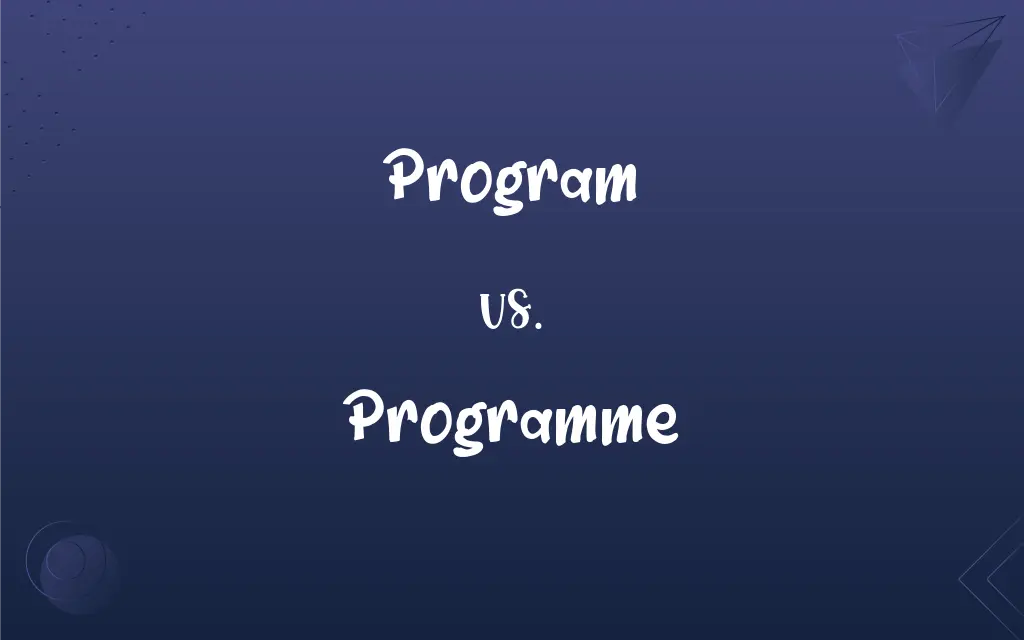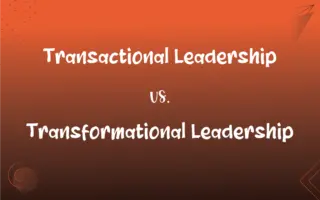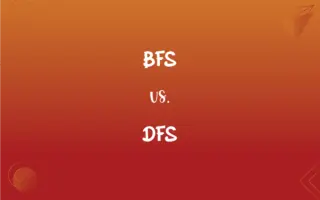Program vs. Programme: What's the Difference?
Edited by Harlon Moss || By Janet White || Published on February 14, 2024
"Program" is the preferred spelling in American English for all senses, while "programme" is used in British English for all but computing.

Key Differences
The primary difference between "program" and "programme" lies in regional spelling variations. "Program" is the preferred spelling in American English, used for both computing and general contexts. In contrast, "programme" is the standard spelling in British English when referring to a plan or schedule of events, but not in computing.
In the context of computing, referring to a set of coded instructions for computers, the spelling "program" is universally used, even in British English. On the other hand, "programme" is never used in this context, regardless of the regional variant of English.
For general uses, such as a list of items in a concert, a television show, or a plan of action, American English always uses "program." In British English, these instances would typically use "programme." For example, a TV guide would list "programmes" in the UK, but "programs" in the US.
The word "program" comes from the Greek "programma," meaning a written public notice. The spelling variations developed with American and British English divergences, where American English simplified certain British spellings. The usage of "programme" in British English retains this older form.
In educational or institutional contexts, such as referring to a study plan or a set of policies, both American and British English use "program." For instance, one would refer to a "graduate program" in the US and also in the UK.
ADVERTISEMENT
Comparison Chart
Computing Context
Always "program"
Always "program"
General Non-Computing
"Program" for schedules, TV shows
"Programme" for the same contexts
Regional Preference
Standard in all contexts
Used except in computing
Historical Origin
Simplified American spelling
Traditional British spelling
Educational Context
"Program" for educational courses
"Program" for educational courses
ADVERTISEMENT
Program and Programme Definitions
Program
A set of coded instructions for a computer.
She wrote a program to automate the data analysis.
Programme
A broadcast on television or radio (British English).
I watched an interesting documentary programme last night.
Program
A schedule of events in a public performance.
The theater's program included a list of all the acts.
Programme
A schedule or list of events in a public performance (British English).
The concert programme detailed each musical piece.
Program
A broadcast on television or radio.
My favorite TV program airs every Friday night.
Programme
A planned series of future events or performances (British English).
The festival's programme includes several theatrical plays.
Program
An organized plan of activities.
The community center launched a new fitness program.
Programme
An organized plan or series of activities (British English).
The university introduced a new educational programme.
Program
A planned series of future events or performances.
The summer music festival's program features various artists.
Programme
A leaflet or booklet listing items at an event (British English).
The wedding programme outlined the ceremony's proceedings.
Program
A listing of the order of events and other pertinent information for a public presentation.
Programme
Variant of program.
Program
The presentation itself
A program of piano pieces.
Programme
Standard spelling of program
Our programme for today’s exercise class includes swimming and jogging.
The programme about Greek architecture starts at 9:00 on Channel 4.
FAQs
What is a program in American English?
A program can refer to a computer code, a TV show, or a planned series of events.
How do you spell a TV show in American English?
It's spelled as "program" in American English.
Can "programme" be used for educational courses in the UK?
No, even in British English, "program" is used for educational courses.
What is a programme in British English?
A programme refers to a planned series of events or a TV show, but not computer code.
How do you refer to a computer application in the UK?
It's referred to as a "program" even in the UK.
What does "programme" mean in the context of a festival in the UK?
It refers to the schedule or list of events at the festival.
Is "program" used for computing in both American and British English?
Yes, "program" is the standard spelling in computing contexts in both variants.
In British English, is "programme" used for radio broadcasts?
Yes, "programme" is used for both TV and radio broadcasts.
Is the spelling "programme" ever correct in American English?
No, American English always uses "program."
What's the spelling for a concert lineup in American English?
It's spelled "program" in American English.
What is the preferred spelling in Canadian English?
Canadian English often uses "program," especially in computing and education.
Does "programme" have different meanings in British English?
Yes, it can refer to a broadcast, an event schedule, or a series of planned activities.
How did the spelling variations develop?
They developed due to divergences in American and British English.
Is "programme" used in Australian English?
Yes, Australian English typically follows British spelling, using "programme."
Is "program" used in British English for TV guides?
No, British English uses "programme" for TV guides.
What spelling should be used for a software developer's job?
"Program" is the correct spelling in this context, regardless of the region.
Are there any contexts where both spellings are correct?
In educational contexts, "program" is universally used.
How is "programme" pronounced compared to "program"?
Both are pronounced the same despite the spelling difference.
Does the spelling differ for a list of policies in an organization?
No, it's spelled "program" in both American and British English.
In British English, how do you spell a leaflet at a theatre?
It's spelled as "programme."
About Author
Written by
Janet WhiteJanet White has been an esteemed writer and blogger for Difference Wiki. Holding a Master's degree in Science and Medical Journalism from the prestigious Boston University, she has consistently demonstrated her expertise and passion for her field. When she's not immersed in her work, Janet relishes her time exercising, delving into a good book, and cherishing moments with friends and family.
Edited by
Harlon MossHarlon is a seasoned quality moderator and accomplished content writer for Difference Wiki. An alumnus of the prestigious University of California, he earned his degree in Computer Science. Leveraging his academic background, Harlon brings a meticulous and informed perspective to his work, ensuring content accuracy and excellence.







































































